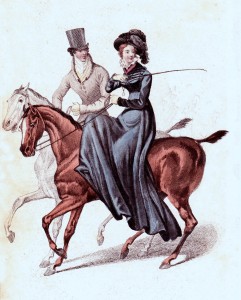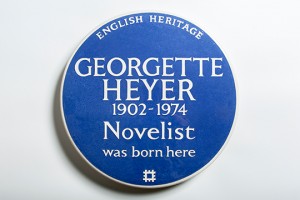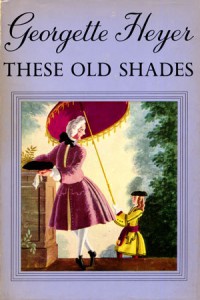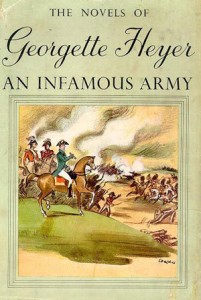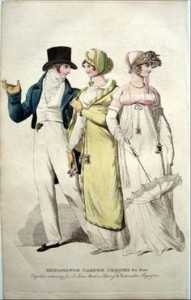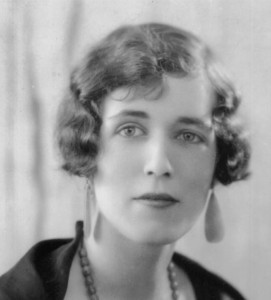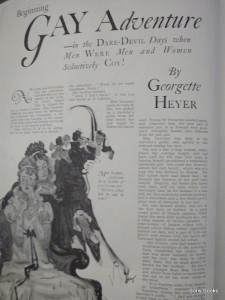Archive for the ‘Georgette Heyer’ Category
Georgette Heyer: After the Plaque
Random jottings from the day by someone who felt privileged to be there, along with Georgette Heyer’s family – nephew Major General Jeremy Rougier, daughter-in-law and dedicatee of FALSE COLOURS Susanna, Lady Rougier and grandsons Nicholas Rougier and Noel Flint – friends, countless devoted authors and an extremely enthusiastic home team from Wimbledon.
To start with authorial trivia – we used this illustration from La Belle Assemblee as the back cover of the programme. It was kindly provided by Regency author Louise Allen, from her personal collection of prints. (I feel Miss Heyer would have approved.) We both suspect that it may have been the inspiration for Sophy’s dashing riding habit which she is wearing when she encounters Miss Wraxton and Charles in the Park and Miss Wraxton pointedly only compliments her horse.
I promised that I would put up my take on events on the great day when Georgette Heyer and her birthplace received an English Heritage Blue Plaque. There is a great account of the history and purpose of Blue Plaques on their website . The very first person to be awarded one was Byron. I hope that would have pleasedMiss Heyer – and possibly made her laugh.
There is a truly excellent account of the unveiling — with the bonus of a little trip behind the scenes – by novelist Elizabeth Hawksley.
And then the 50 people who had attended retired to the Garden Hall at St Mary’s Church for tea and fizz, organised primarily by grateful author enthusiasts and the Romantic Novelists Association. We had an advisory panel of mainly Regency writers and Jen Kloester, Heyer’s biographer; I ran the Spreadsheet; while indomitable RNA stalwarts Jan Jones and Roger Sanderson made sure everyone was fed watered and had somewhere to sit. Remove balloons, replace flowers with much loved favourite Georgette Heyer books and you get the picture:
To interpolate another behind the scenes revelation here, the organisers did audition prosecco for the fizz role, on the grounds that is was light, summery and economical. But we rejected it in favour of champagne. Prosecco never achieved a mention in Heyer’s books and she deserved everything as handsome as we could make it. Though, as one gentleman reader pointed out, she mentioned champagne at least as often in connection with boot polishng as she did with quaffing. Maybe we should have had ratafia or orgeat .Yes, OK, I was OIC organisation and am still too close to it!
It was a terrific party – one of the nicest I’ve ever been to. People who had never met before were already chatting as they walked in through the door. There was huge satisfaction at the recognition of Georgette Heyer’s much loved work. For once, you felt, justice had been done. I heard favourite quotations on all sides – ‘I meant a well-bred horse’ ‘Hyde Park soldiers’ ‘a little bit on the go’ — and people who had never met before collapsed into shared laughter over a treasured Heyer moment. Above all it was warm, and friendly and fun.

Susanna, Lady Rougier, Maj Gen Jeremy Rougier, Dr Jennifer Kloester
photograph courtesy of Miranda Spatchurst
We were to have favourite readings over tea and it had fallen to me to choose them. As one of the world’s natural democrats, I had asked readers to tell me their favourite book, character and incident. Democracy is a terrible trap. People who wanted the same book, didn’t want the same incident or character. Cat herders of the world unite! In the end we had pieces from THE UNKNOWN AJAX, VENETIA and AN INFAMOUS ARMY. They were all splendidly read by actor Ric Jerrom and each book was the favourite of at least two people present. The company was spellbound. (‘Rapt,’ said my Dearest Friend and Severest Critic, in between buttling for Britain. He had just read AJAX, as his first ever Heyer, and had a lot to take in.) The announcement of VENETIA was received with a gusty sigh of pleasure.

The Pan Edition which was sitting on one of the tables
And yes, that was the scene Ric read, complete with dog.
In my Democratic Consultation on the readings, the winner by a fair margin was AJAX – people even wanted to hear the same scene – the splendidly theatrical final Pageant of Ajax, with Richmond drunk, Claud rising astonishingly to the occasion, and Lady Aurelia, a mere female with every one of her eleven earl ancestors at her back, dismissing the Officer of the Law in one crisp speech. I’ve always admired that scene but, read aloud, it was funny, exciting, humane and touching on so many levels. ‘Great writing,’ said Ric Jerrom, who hadn’t read her before. His is the masterly voice of Jack Aubrey and Stephen Maturin in the audio versions of Patrick O’Brian’s masterwork.
The big romantic title missing, of course, was the perennial favourite, THESE OLD SHADES. And – was it Fate? – the two people who had voted it their favourite, didn’t manage to make the tea. That coincidence gave me a frisson, I admit. Georgette Heyer married in St Mary’s Church in 1925, just six weeks after her father — mentor and greatest friend, who utterly supported and believed in her writing and whose work she critiqued and vice versa – had died suddenly after a game of tennis. It was a terrible loss. But he had already commented on THESE OLD SHADES , perhaps her most joyful book and unashamedly high romance, So the book was ready for publication, with his notes on her ms.
And following the reading of Colonel Audley’s encounter with Captain Kincaid of the 95th from AN INFAMOUS ARMY, Georgette Heyer’s nephew, Major General Jeremy Rougier, told us a brilliant story.
In 1964 he was a military assistant to a member of the Army Board (the top management of the Army) and they paid an official visit to Belgium. On a free afternoon they were taken on tour of the battlefield at Waterloo by the Professor of Military Studies at the Belgium Military Academy. Their guide was fascinating; he knew the position of every regiment at any time on both sides. “At about 3pm Napoleon was standing here – no, here,” he would say, moving 10 foot to record the precise spot. At the end he presented him with a signed copy of Georgette Heyer’s book and explained their connection. ‘He was as near speechlessness as a professor of military history can be,’ said the Major General. ‘He said, ‘This is the nearest to reality that one will ever come without having been there.” And he fainted!’
Allowing for the professor’s excessive sensibility — the storyteller’s dramatic licence was much appreciated — the readers of Georgette Heyer present were gratified but not really surprised.
For this was really a day in which people who knew her worth came together and celebrated that the word was getting out there. I had asked a number of them to give me their personal experience of reading her books. So I want to end this post with the very first reader to send me his contribution. It is a good representative of what we were all saying in our different ways.
‘As a young medical student, I came across ‘The Corinthian’. I think my brother discovered it first. I loved it; I thought it was hilarious and laughed no end. That set me off on reading Georgette Heyer books. I particular like the Regency stories with a nice plot, e.g. ‘The Reluctant Widow, ‘The Talisman Ring’, ‘The Unknown Ajax’, ‘The Toll Gate’ etc. Then I discovered some more historical novels, starting with ‘Royal Escape’ and ‘An Infamous Army’. Finally I came across ‘Envious Casca’ which set me off to reading all her detective stories.
‘In all of these different types of novel, the characterisation is so well done and reading them is such pleasure however often one has read them before. These are books to own and keep permanently on one’s bookshelves (or perhaps on Kindle?), not borrow them from the library. Whenever I am ill enough to retire to bed, I always take a Georgette Heyer book to bed with me to cheer me up.’
He emphasises something it is easy to forget. When I started to help with this celebration, I said to people who muttered about the time I was taking away from my writing to spend on it that a) it was a unique occasion and b) it was a small thank you to Georgette Heyer for a lifetime of interest and pleasure. I said it lightly – well, irritably sometimes — but it was true. A lifetime. And every reader I approached to write something, to help, to come along said the same thing.
So many lifetimes made happier by her books.
What a legacy. What a writer.
Georgette Heyer: The Space Between the Words
Re-reading Georgette Heyer’s work in advance of Blue Plaque Day has been an unexpected voyage of discovery. I’ve loved her books for ever, of course. But typing out an extract from AN INFAMOUS ARMY gave me a real jolt.
It is the morning of the battle of Waterloo. Some men, sleeping out in the cold and wet, have died in the night and everyone is sodden: old soldiers became busy drying their clothes and cleaning their arms; young soldiers stared over the dense mist in the valley to the ridge where the French were beginning to show themselves. Read it aloud, as I did. In two paragraphs she gets all the terror of the impending battle, the imminence of death, the fear of the raw recruits, the numbness of those who have been here before.
And I realised exactly what makes her such a brilliant writer for so many different sorts of readers. It’s in the things she doesn’t say. As Browning had it, she does the thing shall breed the thought. Then there comes that little electrical charge between what she has written and your imagination and suddenly, there you are, seeing what she saw, feeling what you feel.
Consider what Sarah McConnell was saying, in response to my last post, about that agonising scene in SPRIG MUSLIN. We readers have had a picture of Lady Hester – whose family think she’s a born spinster. She runs her father’s household and is regularly called in to nurse or babysit by her married sisters. She’s past the first blush of youth, not very pretty, turned down the only proposals of marriage she ever received and is really a bit vague. Then, suddenly, rich Sir Gareth Ludlow with whom she has been friends ever since his spirited first love died, proposes. She turns him down and he, being a reasonable man, sets out the advantages of the match: her situation is not happy, she would be at no one’s beck and call, with a position of the first consequence and a husband who would not make unreasonable demands.
‘You may be sure that I should always attend to your wishes, and hold you in respect and affection. Would that not mean a happier life than the one you live now?’
Her face was very white; she pulled her hand away, saying in a stifled voice: ‘No — anguish!’
This seemed so strange a thing for her to have said that he thought he could not have heard her aright. ‘I beg your pardon?’ he said blankly.
No more words but it’s all there: the pain of unrequited love and, worse, the sheer awful loneliness of pain unacknowledged and unacknowledgeable. In a sentence. God, she was good.
Or there’s my own favourite, the moment in FRIDAY’S CHILD — which up until then has been pure joy, as if Jane Austen had written Bertie Wooster — when the heroine runs away from her husband and his daft friends try to help her:
She bent her head, looking down at her tightly clasped hands. ‘Sherry – Sherry doesn’t love me, you see. He– he never did love me. If I had not been such a silly g-goose, I should not not have — For he never pretended that he loved me you know.’
George’s face twisted. He came quickly back into the room and laid his hands over both Hero’s and gripped them. ‘I know,’ he said in a moved voice.
She nodded. ‘Yes. I-I thought you did, George. So, you see . . . ‘
There was an uncomfortable silence.
And you see that they are not just daft any more, not even George Wrotham who has been stamping about like Lord Byron at his worst and generally making a cake of himself over the Beauty. The feelings are real. They hurt. You don’t want to spend too much time there, any more than you want to press on a bruise, but you know.
That was when it occurred to me – what a total gift to a film maker. The delicious prose, the mock heroic authorial comments, no you couldn’t put those on the screen. But these moments of truth coupled with some of the best dialogue outside Restoration Comedy or PG Wodehouse – what a treasure trove for a screen writer, for an actor.
Of course, those wonderful Georgette Heyer readers had got there first. There’s even an online petition you can sign. It had 1,238 signatures when I found it.
Now it’s got one more.
Georgette Heyer and her Readers
Fans of Georgette Heyer will feel a quiet sense of satisfaction at the news that English Heritage are to place one of their Blue Plaques on her first home in Wimbledon next month. It is another step towards the public acknowledgement of a truth which, if not yet held universally, has been acknowledged by countless people all round the world for a long, long time. She is a Treasure.
But, as is the case with so many Treasures, we can’t all agree why and, like every writer I know, she does have her detractors. (Shakespeare? Couldn’t plot for toffee. When people praised WS’s manuscript for his ‘never blotting out line’, Jonson wittily replied, ‘Would he had blotted a thousand.’ Killer punch there, Ben.)
Carmen Callil, a woman of whose publishing achievements I am in awe, allegedly opined that Heyer took Jane Eyre and rejigged it 57 times. Not true – Heyer never really hit the Gothick note. And even her most enigmatic and brooding hero has a sense of the ridiculous, which neither Mr Rochester nor Jane quite manages. But I completely see why a lively feminist publisher would take agin books in which the highest good to which the heroine aspires is marriage to an eligible –i.e. always wealthy, often titled — man.
More seriously, an Editorial Director I much admire told me a few years ago that Heyer had badly needed editing. I don’t know how that would have played with the strong-minded Heyer. From her career-long vituperative joust with the respected editor of Woman’s Journal, Dorothy Sutherland (who tried) I suspect that Heyer wouldn’t have put up with it. And if a publisher insisted, it might have shut her up for good. The loss doesn’t bear thinking about.
Mind you, Sutherland’s preferred title for Regency Buck wasn’t great, even without the connotations that have accrued to it since 1935. And her strap line? Words fail me.
–in the Dare-Devil Days when Men Were Men and Women Seductively Coy!
But I don’t mean to talk about my own opinions here. These are not my ideas, but those of her millions of readers. For since the Blue Plaque announcement, I have been trotting through the Forest of Internet in search of Heyer fans and found — well, overwhelmingly more than I expected. Of course there are the Heyer Appreciators, many of whom are to be found at Almacks. And from Mumsnet through The Guardian to Jane Austen blogs and uncountable numbers of bloggers — some loving her for ever, some just discovering her, some arguing furiously over where she did and didn’t do what they wanted (Smart Readers Trashy Books is really good at that) — Heyer’s work is considered seriously by a very high class of reader indeed. They are thoughtful, principled and often terrifyingly well- informed. I take my hat off to them.
So Miss Heyer’s readers say:
- she’s writes a cracking good story
- she’s witty and so are her characters
- in fact humour is the first reason many people read her
- romantic situations are well drawn, romantic satisfaction variable – but since some readers adore a book that others hate, that probably reflects temperamental differences as much as anything
- her style is a delight
- she takes you into a fully realised, detailed world
- her sense of period feels spot on
- her history is well-informed and perceptive – also accessible
- her characters have life, fire and principles, even when they’re not very good ones
- her secondary characters are all three dimensional, intrinsic to the story and sometimes delicious
- her books differ more widely than you’d expect or than she herself seems to have thought
- they re-read her, sometimes again and again, over their whole lives
- the good end happily in her books and if the bad don’t end badly, there is nevertheless a sense that justice has been done
- she gets you through bad times
- she both observes and explodes genre expectations (bit narrow this one, but it interests me, so I’ve bunged it in)
- she crosses generations – I noted how often the commentator found Heyer’s books on the shelf of a mother, grandmother, family friend or shared the long loved pleasure with a daughter or granddaughter.
- she is reticent, not just about her personal life but about the emotional development of her characters and their experience of falling in love. (I’m going to come back to this. I think it’s true, especially in her quieter books and I have come to like it. Some readers don’t so much.)
- she’s fun
- with substance
Attendance at the blue plaque unveiling is now up to capacity.
I’ll maintain a waiting list, if anyone would like to come and doesn’t mind waiting to see whether there’s room. Sorry about that, but delighted that so many people want to come and celebrate Georgette Heyer and her work.
*Byatt, A. S. “An Honourable Escape: Georgette Heyer.” Passions of the Mind: Selected Writings. London: Chatto & Windus, 1991. 258-65.
—. “The Ferocious Reticence of Georgette Heyer.” Sunday Times Magazine 5 Oct. 1975: 28-38. Rpt. In Georgette Heyer: A Critical Retrospective. Ed. Mary Fahnestock-Thomas. Saraland, AL: PrinnyWorld, 2001. 289-303.
